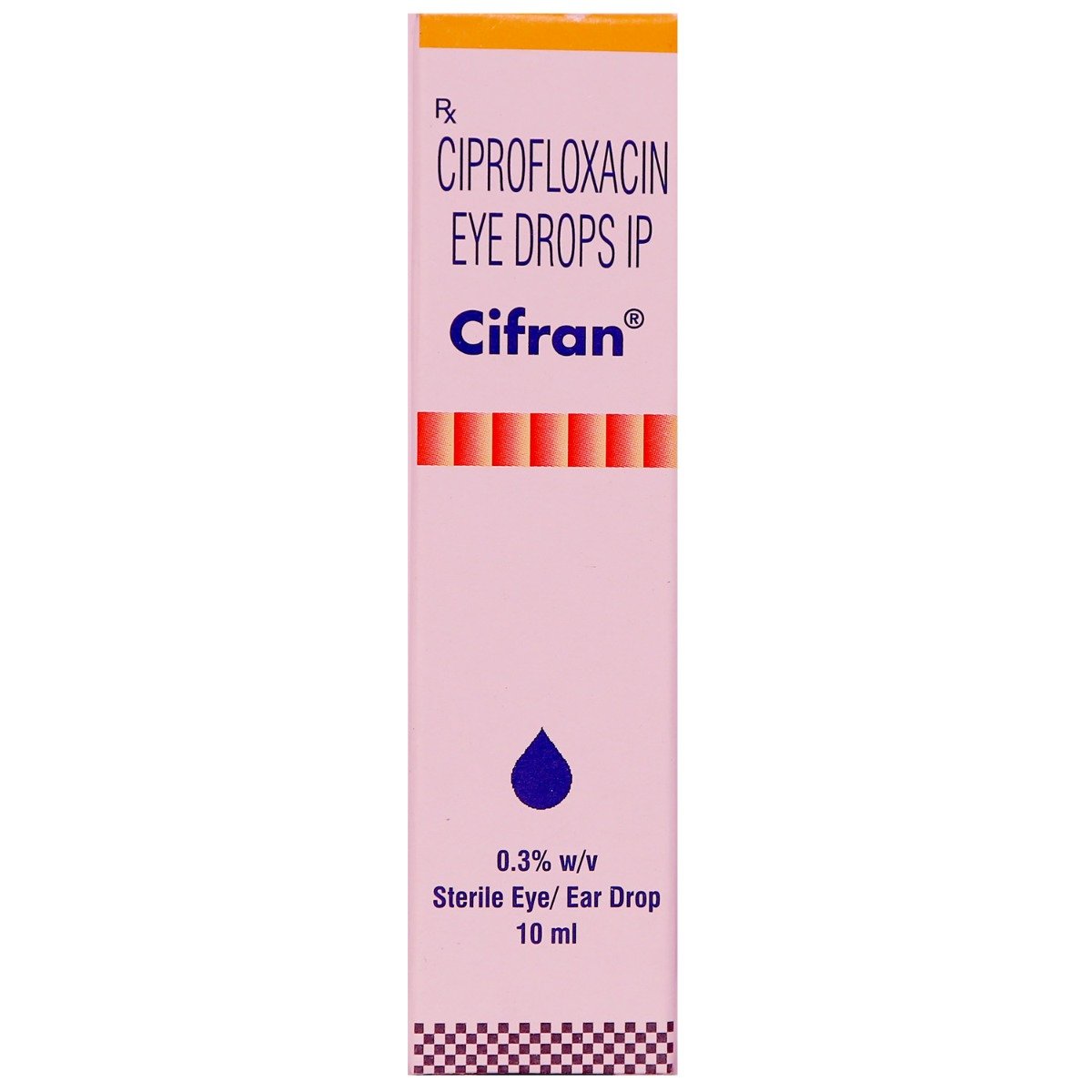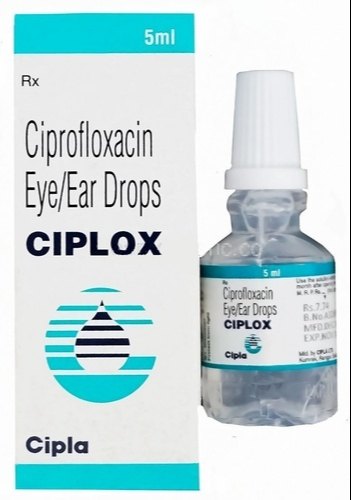Cifran Eye/Ear Drops 10 ml
MRP ₹16
(Inclusive of all Taxes)
₹2.4 Cashback (15%)
Provide Delivery Location
Online payment accepted
 Prescription drug
Prescription drugWhats That
Composition :
Manufacturer/Marketer :
Consume Type :
Expires on or after :
Return Policy :
About Cifran Eye/Ear Drops
Cifran Eye/Ear Drops belongs to the class of medicines known as fluoroquinolone antibiotics used to treat corneal ulcers and bacterial conjunctivitis. A corneal ulcer is an open lesion on the cornea (clear tissue at the front of the eye). Conjunctivitis (pink eye) is the inflammation or infection of the conjunctiva (white part of the eye) and the inner eyelid.
Cifran Eye/Ear Drops contains Ciprofloxacin which works by killing the infection-causing bacteria. Thus Cifran Eye/Ear Drops treats bacterial eye infections and corneal ulcers.
Use Cifran Eye/Ear Drops as advised by the doctor. Stinging or burning sensation, gritty feeling in the eye, irritation, white deposits on the eye surface (cornea), and redness are common side effects of Cifran Eye/Ear Drops. The majority of these side effects fade with time without the need for medical intervention. However, if you experience these side effects on a regular basis, you should visit your doctor.
Cifran Eye/Ear Drops is intended for use in the eyes; do not inject or consume. You should not use Cifran Eye/Ear Drops if you are allergic to ciprofloxacin, other quinolone antibiotics, or any of the components in Cifran Eye/Ear Drops. Notify your doctor if you are pregnant or breastfeeding. Cifran Eye/Ear Drops may cause temporary blurred vision. Before operating machinery or driving, wait until your vision returns to normal.
Uses of Cifran Eye/Ear Drops
Directions for Use
Key Benefits
Cifran Eye/Ear Drops contains Ciprofloxacin, which is an antibiotic (quinolone class). It works by killing the infection-causing bacteria. Thus Cifran Eye/Ear Drops treats corneal ulcers and bacterial conjunctivitis.
Storage
- Hydrate your body: Drink enough water to prevent dehydration and headaches.
- Calm Your Mind: Deep breathing and meditation can help you relax and relieve stress.
- Rest and Recharge: Sleep for 7-8 hours to reduce headache triggers.
- Take rest: lie down in a quiet, dark environment.
- Cold or warm compresses can help reduce tension.
- Stay Upright: Maintain good posture to keep symptoms from getting worse.
- To treat headaches naturally, try acupuncture or massage therapy.
- Over-the-counter pain relievers include acetaminophen and ibuprofen.
- Prescription Assistance: Speak with your doctor about more substantial drug alternatives.
- Severe Headaches: Seek emergency medical assistance for sudden, severe headaches.
- Frequent Headaches: If you get reoccurring headaches, consult your doctor.
- Headaches with Symptoms: Seek medical attention if your headaches include fever, disorientation, or weakness.
- Inform your doctor about dizziness symptoms. They may adjust your medication regimen or prescribe additional medications to manage symptoms.
- Follow your doctor's instructions for taking medication, and take it at the same time every day to minimize dizziness.
- When standing up, do so slowly and carefully to avoid sudden dizziness.
- Avoid making sudden movements, such as turning or bending quickly, which can exacerbate dizziness.
- Drink plenty of water throughout the day to stay hydrated and help alleviate dizziness symptoms.
- If you're feeling dizzy, sit or lie down and rest until the dizziness passes.
- Track when dizziness occurs and any factors that may trigger it, and share this information with your doctor to help manage symptoms.
Drug Warnings
Do not use Cifran Eye/Ear Drops if you are allergic to any of its components. If you are pregnant, planning for pregnancy or breastfeeding, notify your doctor. You may notice temporary blurred vision after using this medication. Before operating machinery or driving, wait until your vision returns to normal. Before using Cifran Eye/Ear Drops, consult your doctor if you have vision problems, severe eye pain, glaucoma (high blood pressure in the eye), eye damage, or eye surgery. Cifran Eye/Ear Drops should not be used for any longer than your doctor has prescribed. Cifran Eye/Ear Drops should not be used to treat any other eye infections.
Drug-Drug Interactions
Drug-Drug Interactions
Login/Sign Up
Taking Amiodarone and Cifran Eye/Ear Drops 10 ml may significantly increase the risk of an abnormal heart rhythm.
How to manage the interaction:
Taking Amiodarone with Cifran Eye/Ear Drops 10 ml is not recommended, it can be taken together if prescribed by a doctor. However, consult your doctor if you experience sudden dizziness, lightheadedness, fainting, shortness of breath. Do not discontinue any medications without consulting a doctor.
Coadministration of Cifran Eye/Ear Drops 10 ml and Tizanidine together can increase the risk of side effects.
How to manage the interaction:
Using Cifran Eye/Ear Drops 10 ml and Tizanidine together is avoided, as it can result in an interaction, it can be taken if your doctor has advised it. However, if you experience drowsiness, weakness, sweating, or palpitations contact the doctor immediately. Do not discontinue any medications without consulting the doctor.
When Dronedarone is taken with Cifran Eye/Ear Drops 10 ml, it can increase the chance of a serious abnormal heart rhythm. If you suffer from any cardiac conditions, or electrolyte disturbances (such as magnesium or potassium deficiency brought on by severe or prolonged diarrhea or vomiting), you may be at higher risk.
How to manage the interaction:
Taking Cifran Eye/Ear Drops 10 ml with Dronedarone is not recommended, it can be taken if prescribed by the doctor. However, if you experience sudden dizziness, lightheadedness, fainting, breathing difficulty, or rapid heartbeat, consult the doctor immediately. Do not stop any medications without a doctor's advice.
Coadministration of sotalol together with Cifran Eye/Ear Drops 10 ml can increase the risk or severity of irregular heart rhythm.
How to manage the interaction:
Taking Sotalol with Cifran Eye/Ear Drops 10 ml is generally avoided as it can result in an interaction, it can be taken together if prescribed by a doctor. However, consult the doctor if you experience sudden dizziness, lightheadedness, fainting, breathing difficulty. Do not discontinue any medications without consulting a doctor.
Using Cifran Eye/Ear Drops 10 ml with Halofantrine can increase the chance of a serious abnormal heart rhythm. If you suffer from any cardiac conditions, or electrolyte disturbances (such as magnesium or potassium deficiency brought on by severe or prolonged diarrhea or vomiting), you may be at higher risk.
How to manage the interaction:
Taking Cifran Eye/Ear Drops 10 ml with Halofantrine is not recommended, it can be taken if prescribed by the doctor. However, if you experience sudden dizziness, lightheadedness, fainting, breathing difficulty, or rapid heartbeat, consult the doctor immediately. Do not stop any medications without a doctor's advice.
Combining Cifran Eye/Ear Drops 10 ml with Thioridazine can increase the chance of a serious abnormal heart rhythm. If you suffer from any cardiac conditions, or electrolyte disturbances (such as magnesium or potassium deficiency brought on by severe or prolonged diarrhea or vomiting), you may be at higher risk.
How to manage the interaction:
Taking Cifran Eye/Ear Drops 10 ml with Thioridazine is not recommended, it can be taken if prescribed by the doctor. However, if you experience sudden dizziness, lightheadedness, fainting, breathing difficulty, or rapid heartbeat, consult the doctor immediately. Do not stop any medications without a doctor's advice.
When Cifran Eye/Ear Drops 10 ml is taken with Quinidine, it can increase the chance of a serious abnormal heart rhythm.
How to manage the interaction:
Taking Cifran Eye/Ear Drops 10 ml with Quinidine is not recommended, it can be taken if prescribed by the doctor. However, if you experience sudden dizziness, lightheadedness, fainting, breathing difficulty, or rapid heartbeat, consult the doctor immediately. Do not stop any medications without a doctor's advice.
Using Cifran Eye/Ear Drops 10 ml with Procainamide can increase the chance of a serious abnormal heart rhythm.
How to manage the interaction:
Taking Cifran Eye/Ear Drops 10 ml with Procainamide is not recommended, it can be taken if prescribed by the doctor. However, if you experience sudden dizziness, lightheadedness, fainting, breathing difficulty, or rapid heartbeat, consult the doctor immediately. Do not stop any medications without a doctor's advice.
When Cifran Eye/Ear Drops 10 ml is taken with Pimozide, it can increase the chance of a serious abnormal heart rhythm. If you suffer from any cardiac conditions, or electrolyte disturbances (such as magnesium or potassium deficiency brought on by severe or prolonged diarrhea or vomiting), you may be at higher risk.
How to manage the interaction:
Taking Cifran Eye/Ear Drops 10 ml with Pimozide is not recommended, it can be taken if prescribed by the doctor. However, if you experience sudden dizziness, lightheadedness, fainting, breathing difficulty, or rapid heartbeat, consult the doctor immediately. Do not stop any medications without a doctor's advice.
Using Cifran Eye/Ear Drops 10 ml with Mesoridazine can increase the chance of a serious abnormal heart rhythm. If you suffer from any cardiac conditions, or electrolyte disturbances (such as magnesium or potassium deficiency brought on by severe or prolonged diarrhea or vomiting), you may be at higher risk.
How to manage the interaction:
Taking Cifran Eye/Ear Drops 10 ml with Mesoridazine is not recommended, it can be taken if prescribed by the doctor. However, if you experience sudden dizziness, lightheadedness, fainting, breathing difficulty, or rapid heartbeat, consult the doctor immediately. Do not stop any medications without a doctor's advice.
Drug-Food Interactions
Drug-Food Interactions
Login/Sign Up
Diet & Lifestyle Advise
- To naturally renew your eyes, get at least six to eight hours of sleep each night.
- Wash your eyes with clean water. If you have had eye surgery, wait at least two weeks before washing your eyes.
- Take care of your health, eat a balanced diet, do regular exercise, and rest well.
- Hydrate well-drink lots of water.
- Wash your hands regularly, avoid touching eyes with dirty hands.
Side Effects of Cifran Eye/Ear Drops
- Itching
- Burning sensation
- Stinging sensation
- Gritty feeling in the eye
- Irritation
- Blurred vision
- White deposits on the eye surface (cornea)
- Redness
Habit Forming
Therapeutic Class
All Substitutes & Brand Comparisons
RX
Out of StockCipropen Eye/Ear Drops
Morepen Laboratories Ltd
₹7.35
(₹0.66/ 1ml)
54% CHEAPERRX
Out of StockCeepro Eye/Ear Drops
Lincoln Pharmaceuticals Ltd
₹7.5
(₹0.68/ 1ml)
52% CHEAPERRX
Out of StockC Flox Eye/Ear Drops
₹5
(₹0.9/ 1ml)
37% CHEAPER
Author Details
We provide you with authentic, trustworthy and relevant information
Drug-Diseases Interactions
Drug-Diseases Interactions
Login/Sign Up
FAQs
Cifran Eye/Ear Drops works by killing the infection-causing bacteria. Thus Cifran Eye/Ear Drops treats corneal ulcers and bacterial conjunctivitis.
Cifran Eye/Ear Drops can be used with other eye medications if prescribed by a doctor. However, maintain a gap of 15-minutes between Cifran Eye/Ear Drops and other eye medicines.
Even if your symptoms improve, you must continue to use Cifran Eye/Ear Drops as suggested by your doctor. Do not stop using Cifran Eye/Ear Drops without consulting your doctor.
Do not wear contact lenses while using Cifran Eye/Ear Drops. Remember to remove the contact lenses before using Cifran Eye/Ear Drops. It is advised to wear spectacles and avoid contact lenses until the infection is cleared.
You should not use Cifran Eye/Ear Drops for more than 21 days unless your doctor instructs you otherwise. Please reach out to the doctor if your symptoms do not improve or if it becomes worse.
Disease/Condition Glossary
Bacterial conjunctivitis: Conjunctivitis (pink eye) is the inflammation or infection of the conjunctiva (white part of the eye) and the inner eyelid. It is a highly contagious infection that is spread by eye secretions. Symptoms include redness, itchiness, and discharge or crusting around the eye.
Corneal ulcers: A corneal ulcer is an open lesion on the cornea (clear tissue at the front of the eye) often caused by infection. Symptoms include red, watery eyes, bloodshot eyes, severe eye pain, and eye discharge.

Have a query?
Alcohol
Safe if prescribed
It is not known if alcohol affects Cifran Eye/Ear Drops. However, it is advisable not to take or limit alcohol as a precautionary measure.
Pregnancy
Consult your doctor
Consult your doctor if you are pregnant or planning for pregnancy.
Breast Feeding
Consult your doctor
Consult your doctor if you are breastfeeding. Caution should be exercised when Cifran Eye/Ear Drops is administered to nursing mothers.
Driving
Safe if prescribed
Cifran Eye/Ear Drops may temporarily blur your vision. Before driving or operating any machinery, wait until your vision has returned to normal.
Liver
Consult your doctor
Limited information is available about the usage of Cifran Eye/Ear Drops in patients with liver disease. Please consult your physician.
Kidney
Consult your doctor
Limited information is available about the usage of Cifran Eye/Ear Drops in patients with kidney disease. Please consult your physician.
Children
Safe if prescribed
Cifran Eye/Ear Drops is not recommended for use in children less than 1 year of age unless directed by your doctor.











_0.jpg?tr=q-85)
